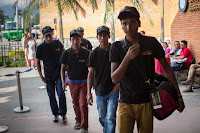Over 100,000 unemployed people are set to get paid work as part of the Prime Minister Employment Programme (PMEP), the new Nepal wage-employment scheme launched in February 2019 that aims to provide minimum days of work for unemployed citizens. While starting up in 2019, the programme has calculated that a minimum 30 days of work can be ensured to a total of 106,872 people this fiscal year. However, the goal is to provide minimum 100 days of work for unemployed citizens of the working age (18 to 59 years). The government plans to provide citizens with guaranteed sustenance equal to half of the agreed upon wage for 100 days, should it fail to provide employment. “They can repair playground or schools, do plantation, work for dam and canal building,” said Prakash Dahal, the programme chief and joint secretary at the Ministry of Labour, Employment and Social Security. Most jobs available seem to be in the construction sector.
The government plans to collect information on the unemployed through the newly set-up Employment Service Centres, which have been created in all 753 local units of the country. The centres are supposed to have information, through an online database, on locally available jobs, and can match registered job seekers to suitable employment.
Coordination among the three levels of government is crucial for an effective implementation of the scheme to provide jobs for the poor and unemployed sections of the society. A minimum amount of R300,000 to maximum Rs10 million has been sent to all the local units for implementation of the scheme. The amount for each local unit has been distributed after calculating three factors—number of households with poverty, the total population of the local unit, and its remoteness. Local, provincial and federal governments have started signing tripartite agreements for the implementation of the Prime Minister Employment Programme. This is linked to an ambitious plan to create 500,000 jobs in the next fiscal year.

Every year nearly 500,000 workers enter the job market and end up jobless in the country, and more than 4,3 million Nepali have chosen to migrate abroad. Youth unemployment rate is estimated at 35.8 percent.
The government plans to collect information on the unemployed through the newly set-up Employment Service Centres, which have been created in all 753 local units of the country. The centres are supposed to have information, through an online database, on locally available jobs, and can match registered job seekers to suitable employment.
Coordination among the three levels of government is crucial for an effective implementation of the scheme to provide jobs for the poor and unemployed sections of the society. A minimum amount of R300,000 to maximum Rs10 million has been sent to all the local units for implementation of the scheme. The amount for each local unit has been distributed after calculating three factors—number of households with poverty, the total population of the local unit, and its remoteness. Local, provincial and federal governments have started signing tripartite agreements for the implementation of the Prime Minister Employment Programme. This is linked to an ambitious plan to create 500,000 jobs in the next fiscal year.

Every year nearly 500,000 workers enter the job market and end up jobless in the country, and more than 4,3 million Nepali have chosen to migrate abroad. Youth unemployment rate is estimated at 35.8 percent.

No comments:
Post a Comment
Note: only a member of this blog may post a comment.